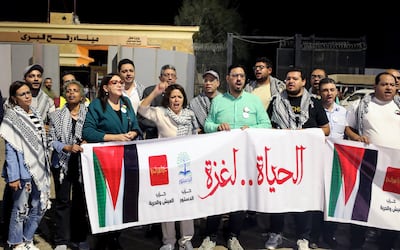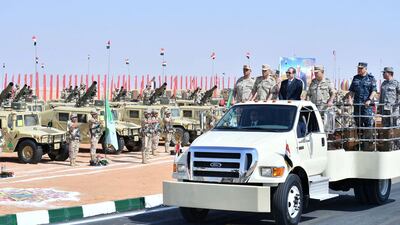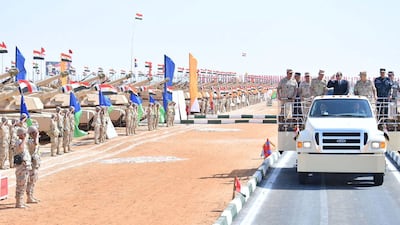Live updates: Follow the latest on Israel-Gaza
The road from Cairo to the Rafah border crossing is less than 350km, but aid convoys leaving the Egyptian capital headed for the border with Gaza face an arduous journey of at least 12 hours, with security forces on high alert.
Movement on the road is severely slowed by military checkpoints put up to control the entry of goods and people into Egypt’s North Sinai province.
Sinai has long been a securitised region and includes several restricted military zones, established by the Egyptian military as it battles an ISIS insurgency. But security has increased since the outbreak of the Israel-Gaza war on October 7.
Rafah, the only border crossing into the besieged Gaza strip that is not in Israel, is the destination of aid convoys from around the world.
Convoys leaving Cairo face delays at checkpoints, but must also navigate camera crews and equipment set up by local and international television stations who are filming the aid making its way to Gaza.
Many of the vehicles in the convoys bear large banners, expressing solidarity with the Palestinian people, that have become symbols of the war.
Egyptian opposition convoy reaches Rafah
A small aid convoy organised by several Egyptian political parties – Al Dostour, Bread and Freedom and Al Karama – made the long journey from Cairo to North Sinai and arrived at the Rafah border crossing on Sunday night.
At the helm of the convoy was Gameela Ismail, a prominent figure of the January 25 revolution who last month withdrew her bid for Egypt’s December presidential election.
“What is happening in Gaza is nothing short of barbarism at the hands of an oppressive occupier and I think every political entity in the Arab world should be doing its utmost to call for a ceasefire,” Ms Ismail told The National from the Rafah crossing on Sunday night.
“We brought a small convoy, what we could gather through our donations, but the more important part of this visit is to call for a ceasefire because no amount of aid is enough to alleviate the horrors of living under such a violent occupation.”
Ms Ismail led a short protest on Sunday night, chanting that Palestine was stronger with Egyptian support and condemning Israel's killing of women and children.
“I have been following this war on the news and on social media since it started and it has been heartbreaking, but being here and getting a small glimpse of what Gazans are experiencing every day burns me up inside. It’s so cruel to subject innocents to this,” said Noura Mohamed, a volunteer on Ms Ismail’s aid convoy.
Tension and memories of ISIS in Sinai
The protest took place against a backdrop of chaos and tension at the border. The sound of sirens pierced the night as air strikes across the border shook the ground.
Tanks and armoured personnel carriers regularly moved through the crossing as aid workers unloaded their vehicles for inspection.
A military officer at the crossing told The National it has been difficult to be stationed at the border since the start of the war because it reminded him of the Egyptian military’s struggle against ISIS in the area, known as the Total Operation.
It feels that this area is cursed
Egyptian military officer
“It feels that this area is cursed or something,” said the officer, who wished to remain anonymous. “I served here as a lower-ranking officer during the Total Operation when the terrorists had turned this area into a war zone. It feels like that again to many of us.
“The operation was really terrifying for many Egyptian soldiers in North Sinai and many regularly inflicted injuries on themselves so they could be sent to hospital and escape the fear of being stationed out in the middle of nowhere and constantly under threat of attack.
“We were so happy when it was over.”
Evacuees remain in Al Arish
The military operation has displaced tens of thousands of local Bedouin in North Sinai and also wreaked havoc on the region's economy, which relies heavily on tourism.
The beach city of Al Arish, 45km west of Rafah, has suffered from a lack of tourists since 2014 but is now a hub of activity as journalists, humanitarian workers and politicians flock to the region.
Egyptian authorities designated Al Arish as the centre for Gaza-bound aid after Israel's war on Gaza began in response to Hamas's attack on October 7.
Many foreign citizens who managed to leave Gaza since limited evacuations began as well as some wounded Palestinians have also stayed in Al Arish, a local hotel manager told The National.
“A lot of them have family members who are still inside the strip who they were separated from. We have two guests who haven’t heard from their families since they evacuated,” he said.
On Monday, a large ship carrying medical supplies to erect a field hospital in Al Arish arrived at the city’s port in a further sign that the impact of the Israel-Gaza war on the region is far from over.
The White Lotus: Season three
Creator: Mike White
Starring: Walton Goggins, Jason Isaacs, Natasha Rothwell
Rating: 4.5/5
What can victims do?
Always use only regulated platforms
Stop all transactions and communication on suspicion
Save all evidence (screenshots, chat logs, transaction IDs)
Report to local authorities
Warn others to prevent further harm
Courtesy: Crystal Intelligence
Key findings of Jenkins report
- Founder of the Muslim Brotherhood, Hassan al Banna, "accepted the political utility of violence"
- Views of key Muslim Brotherhood ideologue, Sayyid Qutb, have “consistently been understood” as permitting “the use of extreme violence in the pursuit of the perfect Islamic society” and “never been institutionally disowned” by the movement.
- Muslim Brotherhood at all levels has repeatedly defended Hamas attacks against Israel, including the use of suicide bombers and the killing of civilians.
- Laying out the report in the House of Commons, David Cameron told MPs: "The main findings of the review support the conclusion that membership of, association with, or influence by the Muslim Brotherhood should be considered as a possible indicator of extremism."
Disturbing%20facts%20and%20figures
%3Cp%3E%3Cstrong%3E51%25%3C%2Fstrong%3E%20of%20parents%20in%20the%20UAE%20feel%20like%20they%20are%20failing%20within%20the%20first%20year%20of%20parenthood%3C%2Fp%3E%0A%3Cp%3E%3Cstrong%3E57%25%20vs%2043%25%3C%2Fstrong%3E%20is%20the%20number%20of%20mothers%20versus%20the%20number%20of%20fathers%20who%20feel%20they%E2%80%99re%20failing%3C%2Fp%3E%0A%3Cp%3E%3Cstrong%3E28%25%3C%2Fstrong%3E%20of%20parents%20believe%20social%20media%20adds%20to%20the%20pressure%20they%20feel%20to%20be%20perfect%3C%2Fp%3E%0A%3Cp%3E%3Cstrong%3E55%25%3C%2Fstrong%3E%20of%20parents%20cannot%20relate%20to%20parenting%20images%20on%20social%20media%3C%2Fp%3E%0A%3Cp%3E%3Cstrong%3E67%25%3C%2Fstrong%3E%20of%20parents%20wish%20there%20were%20more%20honest%20representations%20of%20parenting%20on%20social%20media%3C%2Fp%3E%0A%3Cp%3E%3Cstrong%3E53%25%3C%2Fstrong%3E%20of%20parents%20admit%20they%20put%20on%20a%20brave%20face%20rather%20than%20being%20honest%20due%20to%20fear%20of%20judgment%3C%2Fp%3E%0A%3Cp%3E%3Cspan%20style%3D%22font-size%3A%2014px%3B%22%3ESource%3A%20YouGov%3C%2Fspan%3E%3C%2Fp%3E%0A
How to avoid crypto fraud
- Use unique usernames and passwords while enabling multi-factor authentication.
- Use an offline private key, a physical device that requires manual activation, whenever you access your wallet.
- Avoid suspicious social media ads promoting fraudulent schemes.
- Only invest in crypto projects that you fully understand.
- Critically assess whether a project’s promises or returns seem too good to be true.
- Only use reputable platforms that have a track record of strong regulatory compliance.
- Store funds in hardware wallets as opposed to online exchanges.
Under 19 Cricket World Cup, Asia Qualifier
Fixtures
Friday, April 12, Malaysia v UAE
Saturday, April 13, UAE v Nepal
Monday, April 15, UAE v Kuwait
Tuesday, April 16, UAE v Singapore
Thursday, April 18, UAE v Oman
UAE squad
Aryan Lakra (captain), Aaron Benjamin, Akasha Mohammed, Alishan Sharafu, Anand Kumar, Ansh Tandon, Ashwanth Valthapa, Karthik Meiyappan, Mohammed Faraazuddin, Rishab Mukherjee, Niel Lobo, Osama Hassan, Vritya Aravind, Wasi Shah
THE DETAILS
Deadpool 2
Dir: David Leitch
Starring: Ryan Reynolds, Josh Brolin, Justin Dennison, Zazie Beetz
Four stars
So what is Spicy Chickenjoy?
Just as McDonald’s has the Big Mac, Jollibee has Spicy Chickenjoy – a piece of fried chicken that’s crispy and spicy on the outside and comes with a side of spaghetti, all covered in tomato sauce and topped with sausage slices and ground beef. It sounds like a recipe that a child would come up with, but perhaps that’s the point – a flavourbomb combination of cheap comfort foods. Chickenjoy is Jollibee’s best-selling product in every country in which it has a presence.
Mercer, the investment consulting arm of US services company Marsh & McLennan, expects its wealth division to at least double its assets under management (AUM) in the Middle East as wealth in the region continues to grow despite economic headwinds, a company official said.
Mercer Wealth, which globally has $160 billion in AUM, plans to boost its AUM in the region to $2-$3bn in the next 2-3 years from the present $1bn, said Yasir AbuShaban, a Dubai-based principal with Mercer Wealth.
“Within the next two to three years, we are looking at reaching $2 to $3 billion as a conservative estimate and we do see an opportunity to do so,” said Mr AbuShaban.
Mercer does not directly make investments, but allocates clients’ money they have discretion to, to professional asset managers. They also provide advice to clients.
“We have buying power. We can negotiate on their (client’s) behalf with asset managers to provide them lower fees than they otherwise would have to get on their own,” he added.
Mercer Wealth’s clients include sovereign wealth funds, family offices, and insurance companies among others.
From its office in Dubai, Mercer also looks after Africa, India and Turkey, where they also see opportunity for growth.
Wealth creation in Middle East and Africa (MEA) grew 8.5 per cent to $8.1 trillion last year from $7.5tn in 2015, higher than last year’s global average of 6 per cent and the second-highest growth in a region after Asia-Pacific which grew 9.9 per cent, according to consultancy Boston Consulting Group (BCG). In the region, where wealth grew just 1.9 per cent in 2015 compared with 2014, a pickup in oil prices has helped in wealth generation.
BCG is forecasting MEA wealth will rise to $12tn by 2021, growing at an annual average of 8 per cent.
Drivers of wealth generation in the region will be split evenly between new wealth creation and growth of performance of existing assets, according to BCG.
Another general trend in the region is clients’ looking for a comprehensive approach to investing, according to Mr AbuShaban.
“Institutional investors or some of the families are seeing a slowdown in the available capital they have to invest and in that sense they are looking at optimizing the way they manage their portfolios and making sure they are not investing haphazardly and different parts of their investment are working together,” said Mr AbuShaban.
Some clients also have a higher appetite for risk, given the low interest-rate environment that does not provide enough yield for some institutional investors. These clients are keen to invest in illiquid assets, such as private equity and infrastructure.
“What we have seen is a desire for higher returns in what has been a low-return environment specifically in various fixed income or bonds,” he said.
“In this environment, we have seen a de facto increase in the risk that clients are taking in things like illiquid investments, private equity investments, infrastructure and private debt, those kind of investments were higher illiquidity results in incrementally higher returns.”
The Abu Dhabi Investment Authority, one of the largest sovereign wealth funds, said in its 2016 report that has gradually increased its exposure in direct private equity and private credit transactions, mainly in Asian markets and especially in China and India. The authority’s private equity department focused on structured equities owing to “their defensive characteristics.”
UAE currency: the story behind the money in your pockets
WOMAN AND CHILD
Director: Saeed Roustaee
Starring: Parinaz Izadyar, Payman Maadi
Rating: 4/5
The%20specs%3A%202024%20Mercedes%20E200
%3Cp%3E%3Cstrong%3EEngine%3A%20%3C%2Fstrong%3E2.0-litre%20four-cyl%20turbo%20%2B%20mild%20hybrid%0D%3Cbr%3E%3Cstrong%3EPower%3A%20%3C%2Fstrong%3E204hp%20at%205%2C800rpm%20%2B23hp%20hybrid%20boost%0D%3Cbr%3E%3Cstrong%3ETorque%3A%20%3C%2Fstrong%3E320Nm%20at%201%2C800rpm%20%2B205Nm%20hybrid%20boost%0D%3Cbr%3E%3Cstrong%3ETransmission%3A%20%3C%2Fstrong%3E9-speed%20auto%0D%3Cbr%3E%3Cstrong%3EFuel%20consumption%3A%20%3C%2Fstrong%3E7.3L%2F100km%0D%3Cbr%3E%3Cstrong%3EOn%20sale%3A%20%3C%2Fstrong%3ENovember%2FDecember%0D%3Cbr%3E%3Cstrong%3EPrice%3A%20%3C%2Fstrong%3EFrom%20Dh205%2C000%20(estimate)%3C%2Fp%3E%0A
Our family matters legal consultant
Name: Hassan Mohsen Elhais
Position: legal consultant with Al Rowaad Advocates and Legal Consultants.
MATCH INFO
Fixture: Ukraine v Portugal, Monday, 10.45pm (UAE)
TV: BeIN Sports










